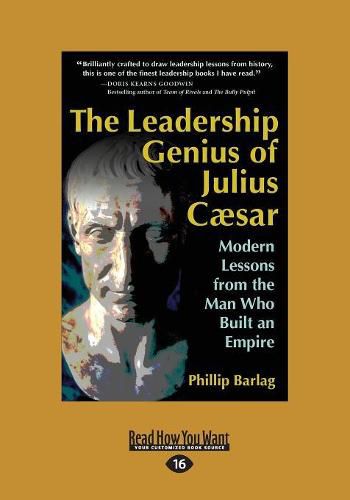Readings Newsletter
Become a Readings Member to make your shopping experience even easier.
Sign in or sign up for free!
You’re not far away from qualifying for FREE standard shipping within Australia
You’ve qualified for FREE standard shipping within Australia
The cart is loading…






History is littered with examples of tyrants, hopelessly out of touch with the plight of the commoners, ruthlessly pursuing their own ambitions or hedonistic whims. But Caesar was a different kind of leader. Despite some bad press, in fact he never saw himself as above the average Roman citizen. Although he certainly knew he was an extraordinary human being, he also regarded himself as fundamentally one of the people, and acted like it. In his life and in his career, he created a new paradigm of leadership, and along the way, created the path to success for any leader in a complex organization. In a book that Doris Kearns Goodwin has called “‘'brilliantly crafted to draw leadership lessons from history,”“ Philip Barlag uses dramatic and colorful incidents from Caesar’s career to illustrate what modern leaders can learn from him. Central to Barlag’s argument is the distinction between power and force. When leading his own organization, Caesar never used brute force to motivate his followers. Time and again he exercised a power rooted in his demonstrated personal integrity and his essentially egalitarian relationship with the Romans. People followed him because they wanted to, not because they were compelled to. Over 2000 years after Caesar’s death this is still the kind of loyalty every leader wants to inspire. Barlag shows how anyone can lead like Caesar.
$9.00 standard shipping within Australia
FREE standard shipping within Australia for orders over $100.00
Express & International shipping calculated at checkout
History is littered with examples of tyrants, hopelessly out of touch with the plight of the commoners, ruthlessly pursuing their own ambitions or hedonistic whims. But Caesar was a different kind of leader. Despite some bad press, in fact he never saw himself as above the average Roman citizen. Although he certainly knew he was an extraordinary human being, he also regarded himself as fundamentally one of the people, and acted like it. In his life and in his career, he created a new paradigm of leadership, and along the way, created the path to success for any leader in a complex organization. In a book that Doris Kearns Goodwin has called “‘'brilliantly crafted to draw leadership lessons from history,”“ Philip Barlag uses dramatic and colorful incidents from Caesar’s career to illustrate what modern leaders can learn from him. Central to Barlag’s argument is the distinction between power and force. When leading his own organization, Caesar never used brute force to motivate his followers. Time and again he exercised a power rooted in his demonstrated personal integrity and his essentially egalitarian relationship with the Romans. People followed him because they wanted to, not because they were compelled to. Over 2000 years after Caesar’s death this is still the kind of loyalty every leader wants to inspire. Barlag shows how anyone can lead like Caesar.